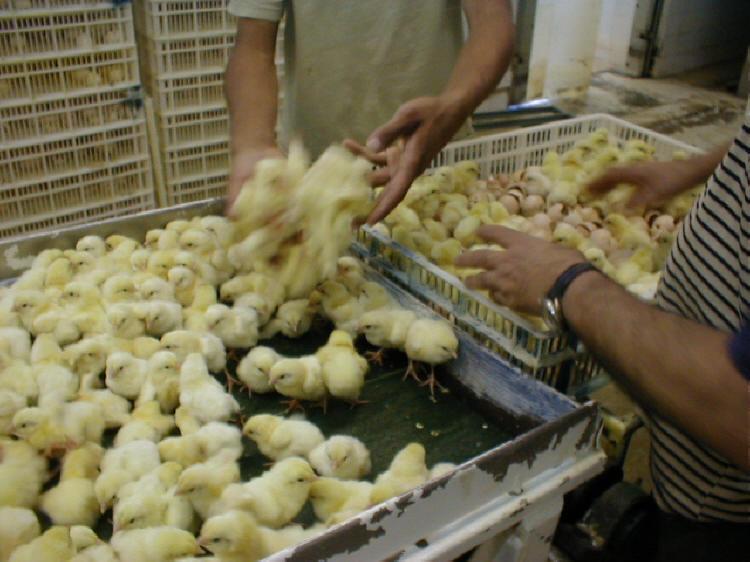
Egg-laying hens are bred for a single trait: laying eggs. Breeders select the most productive hens, which result in greater egg production. Unfortunately, male chicks are not productive, either for laying eggs or producing meat (compared to a chicken bred for meat).
“Somewhere along the way the male chick became disposable," says Janice Neitzel, principal of Sustainable Solutions Group. "The chicks are thrown in to the high-speed grinder and if all goes as planned, killed instantaneously. But it isn’t pretty. Consumers may not be currently aware of this global practice, but with social media -- it is just a matter of time. “
This may change, as Unilever recently announced that it pledges to find a solution to this industry-wide practice, which kills millions of male chicks annually. Unilever will fund research to seek alternatives, such as technologies that allow egg hatcheries to determine the gender of embryos before maturing into chicks.
"We are committed to providing financial support to research and market introduction of in-ovo gender identification (sexing) of eggs, a new technology that has the potential to eliminate the hatching and culling of male chicks in the poultry-breeding industry," Unilever announced in a press release. If successful, this initiative could spare millions of male chickens each year, and it would offer a solution for a major area of concern for animal welfare activists. It is an example of a strong corporate citizenship initiative, where a company is working to solve a problem that could have global implications for the industry. As the third largest consumer goods company in the world, this initiative is part of a goal to source 100 percent of its agricultural raw materials sustainably by 2020. Unilever is working to make the farming industry more humane, while bringing various stakeholders together: egg producers, research and development companies, and the animal welfare community.
"We are arranging meetings with animal-welfare experts, egg industry organizations, suppliers and other stakeholders to develop a multi-stakeholder dialogue and tangible steps to address this important issue and explore alternative options," Unilever announced in its press release.
The male chick initiative adds to recent achievements and commitments by Unilever for more humanely-sourced products. Unilever has a commitment to use exclusively cage-free eggs (also known as non-battery caged) in its products, including mayonnaise, mustard, dressing, ice cream and sauce. Half of the eggs in Unilever’s North America supply are certified by the American Humane Association or Humane Farm Animal Care. This ensures that laying hens are not put in battery cages, where the hen's muscles and bones often deteriorate from lack of space and movement.
“Our mission to use 100 percent cage-free eggs by 2020 is in full swing,” says Deenya Rabius, Category Mix Marketing Director at Unilever Food Solutions. “We already source cage-free eggs for many of our products, and are continuing to expand use as supply grows.”
Sourcing such large quantities of cage-free eggs is not a small feat. Using cage-free eggs for Hellmann's Light Mayonnaise requires an estimated 3.5 million pounds of eggs from 125,000 hens for 30 million jars of mayonnaise.
Sourcing higher welfare ingredients is a smart move for Unilever to protect its brand. “As viral videos bring light to standard agricultural practices, retailers and restaurant chains need to prioritize understanding the supply chain animal welfare practices as consumer knowledge is rising exponentially,” says Neitzel.
Image credit: Animal Friends Croatia (upper photo) and Flickr/Opacity (lower photo)
Sarah Lozanova is a regular contributor to environmental and energy publications and websites, including Mother Earth Living, Green Building & Design, Triple Pundit, Urban Farm, and Solar Today. Her experience includes work with small-scale solar energy installations and utility-scale wind farms. She earned an MBA in sustainable management from the Presidio Graduate School and she resides in Belfast Cohousing & Ecovillage in Mid-coast Maine with her husband and two children.

Sarah Lozanova is an environmental journalist and copywriter and has worked as a consultant to help large corporations become more sustainable. She is the author of Humane Home: Easy Steps for Sustainable & Green Living, and her renewable energy experience includes residential and commercial solar energy installations. She teaches green business classes to graduate students at Unity College and holds an MBA in sustainable management from the Presidio Graduate School.














